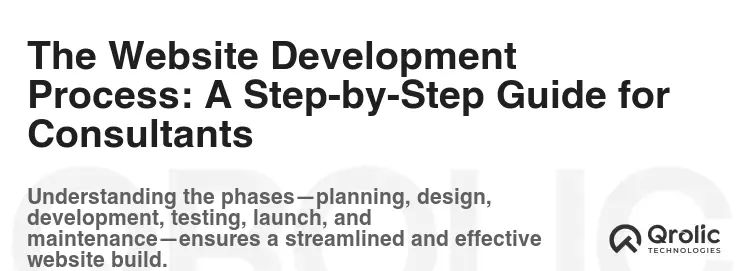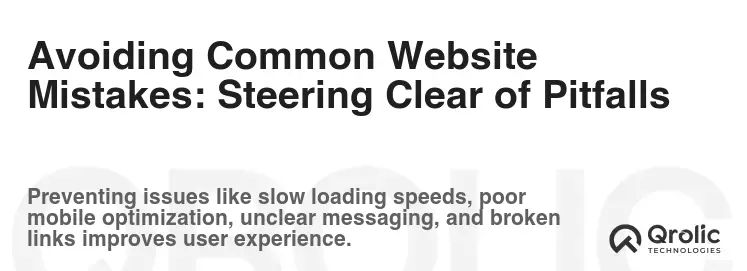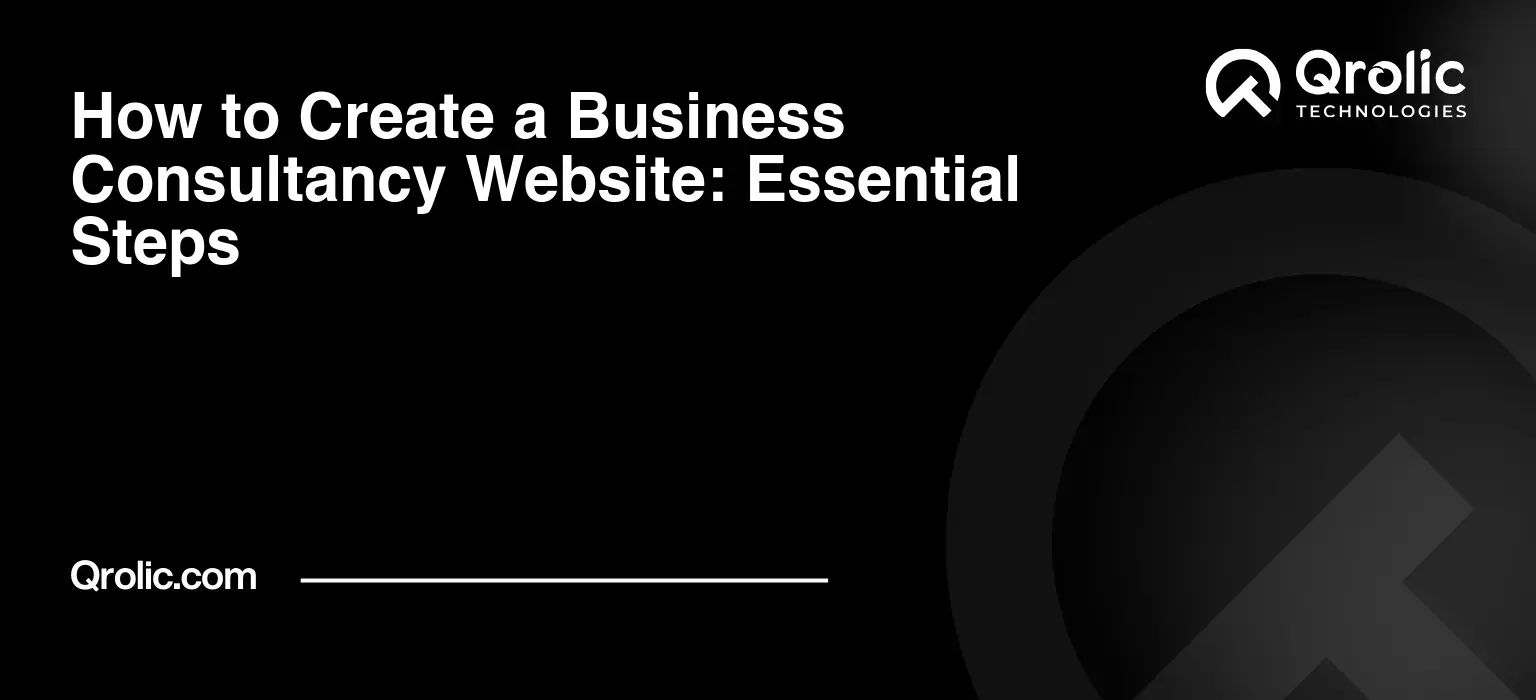In today’s hyper-connected world, a website is more than just an online brochure; it’s a digital storefront, a credibility builder, and a lead generation engine. For business consultants, a well-crafted website is paramount. It’s the first impression, the silent salesperson, and the 24/7 advocate for your expertise. Let’s delve into the crucial aspects of website development that can transform your consulting business.
Quick Summary:
- Your website builds credibility and attracts quality leads.
- Clearly show your unique value and problems you solve.
- Use engaging content and SEO for better visibility.
- Keep your site updated and analyze its performance.
Table of Contents
- Why Business Consultants Need a Powerful Website: Beyond the Basics
- Key Elements of a Winning Consultant Website: Building Blocks for Success
- 1. Clear Value Proposition and Messaging:
- 2. Professional and Engaging Design:
- 3. Comprehensive Service Pages:
- 4. Compelling Case Studies and Testimonials:
- 5. Valuable Content Marketing:
- 6. Strategic Calls-to-Action:
- 7. Easy Navigation and User Experience:
- 8. Contact Information and Communication Channels:
- 9. Security and Trust Signals:
- 10. Analytics and Tracking:
- The Website Development Process: A Step-by-Step Guide for Consultants
- Choosing the Right Website Development Partner: Finding Your Digital Ally
- SEO for Business Consultant Websites: Climbing the Search Engine Ladder
- Avoiding Common Website Mistakes: Steering Clear of Pitfalls
- The Future of Consultant Websites: Embracing Innovation
- Qrolic Technologies: Your Partner in Digital Transformation
- Conclusion: Your Website, Your Competitive Advantage
Why Business Consultants Need a Powerful Website: Beyond the Basics

The question isn’t if you need a website, but how to build one that truly resonates with your target audience and drives tangible results. Here’s why a robust website is indispensable:
- Establishing Credibility and Trust: A professional, informative website immediately signals competence and trustworthiness. Think of it as your digital business card, showcasing your expertise and successful track record. Testimonials, case studies, and certifications displayed prominently build confidence in potential clients.
- Generating High-Quality Leads: A well-optimized website acts as a lead magnet, attracting potential clients actively searching for consulting services. Clear calls-to-action (CTAs), strategic landing pages, and valuable content (like blog posts, white papers, and ebooks) nurture leads and guide them through the sales funnel.
- Showcasing Expertise and Differentiating Yourself: In a competitive landscape, your website is your platform to highlight your unique skills, experience, and methodologies. Showcase your niche expertise, industry specializations, and the specific problems you solve for your clients.
- Improving Brand Visibility and Awareness: A website extends your reach beyond geographical limitations. Through search engine optimization (SEO), you can increase your visibility in search results, attracting a wider audience and building brand awareness.
- Providing 24/7 Availability and Information: Your website is always available to answer questions, provide information, and capture leads, regardless of time zone or operating hours. This constant accessibility is invaluable for attracting and engaging potential clients.
- Streamlining Communication and Client Onboarding: Use your website to facilitate communication, schedule consultations, and even onboard new clients. Online forms, appointment scheduling tools, and client portals can streamline processes and improve efficiency.
- Analyzing Performance and Optimizing Strategies: Website analytics provide valuable insights into user behavior, allowing you to track performance, identify areas for improvement, and optimize your marketing strategies.
Key Elements of a Winning Consultant Website: Building Blocks for Success

A great website isn’t about flashy design; it’s about strategic functionality and user experience. Here are the core components you need to consider:
1. Clear Value Proposition and Messaging:
- Defining Your Target Audience: Who are you trying to reach? What are their pain points, needs, and aspirations? Tailor your messaging to resonate with their specific challenges and goals.
- Crafting a Compelling Headline: Your headline is the first thing visitors see. Make it concise, impactful, and attention-grabbing. Clearly state the value you offer and the problems you solve.
- Highlighting Your Unique Selling Proposition (USP): What makes you different from other consultants? Articulate your unique strengths, methodologies, and the specific benefits clients receive from working with you.
- Using Benefit-Oriented Language: Focus on the tangible results clients can expect, such as increased revenue, improved efficiency, or reduced costs. Avoid jargon and use language that is easy to understand.
2. Professional and Engaging Design:
- Choosing a Clean and Modern Design: A visually appealing website builds credibility and trust. Opt for a clean, modern design that is easy to navigate and visually engaging.
- Maintaining Brand Consistency: Ensure your website design aligns with your overall brand identity, including your logo, colors, fonts, and tone of voice.
- Using High-Quality Images and Videos: Visual content can significantly enhance user engagement. Use professional photos of yourself and your team, as well as relevant images and videos that illustrate your expertise.
- Ensuring Mobile Responsiveness: With the majority of web traffic coming from mobile devices, it’s crucial to ensure your website is fully responsive and looks great on all screen sizes.
3. Comprehensive Service Pages:
- Detailed Descriptions of Your Services: Each service you offer should have its own dedicated page, providing a detailed description of the service, its benefits, and the process involved.
- Showcasing Your Expertise and Experience: Use case studies, client testimonials, and project portfolios to demonstrate your expertise and track record in each service area.
- Addressing Common Questions and Concerns: Anticipate potential client questions and address them proactively on your service pages.
- Including Clear Calls-to-Action: Encourage visitors to take the next step by including clear calls-to-action, such as “Request a Consultation,” “Download Our Free Guide,” or “Contact Us Today.”
4. Compelling Case Studies and Testimonials:
- Demonstrating Real-World Results: Case studies provide concrete evidence of your expertise and the positive impact you’ve had on your clients’ businesses.
- Highlighting the Problem, Solution, and Outcome: Each case study should clearly outline the client’s initial challenge, the solution you implemented, and the measurable results achieved.
- Using Data and Metrics to Quantify Results: Whenever possible, use data and metrics to quantify the impact of your work. For example, “Increased revenue by 20%,” or “Reduced operating costs by 15%.”
- Featuring Client Testimonials to Build Trust: Client testimonials provide social proof and build confidence in your services. Request testimonials from satisfied clients and feature them prominently on your website.
5. Valuable Content Marketing:
- Creating a Blog to Share Insights and Expertise: A blog is a powerful tool for attracting and engaging potential clients. Share valuable insights, industry trends, and actionable tips related to your areas of expertise.
- Optimizing Content for Search Engines: Use relevant keywords, optimize your meta descriptions, and build high-quality backlinks to improve your website’s search engine ranking.
- Offering Free Resources to Attract Leads: Create valuable free resources, such as ebooks, white papers, checklists, and templates, and offer them in exchange for contact information.
- Promoting Content on Social Media: Share your blog posts, case studies, and free resources on social media to reach a wider audience and drive traffic to your website.
6. Strategic Calls-to-Action:
- Guiding Visitors Towards Conversion: CTAs are essential for guiding visitors through the sales funnel and encouraging them to take the next step.
- Using Clear and Concise Language: Use action-oriented language that clearly states the desired outcome, such as “Request a Quote,” “Download Now,” or “Schedule a Consultation.”
- Placing CTAs Strategically Throughout Your Website: Place CTAs on your homepage, service pages, blog posts, and landing pages to maximize their visibility and impact.
- Testing Different CTAs to Optimize Performance: Experiment with different CTA wording, placement, and design to determine what works best for your target audience.
7. Easy Navigation and User Experience:
- Creating a Simple and Intuitive Navigation Menu: Make it easy for visitors to find the information they need by creating a clear and intuitive navigation menu.
- Using a Logical Site Structure: Organize your website content in a logical and hierarchical manner to improve user experience and search engine optimization.
- Ensuring Fast Loading Times: Website loading speed is a crucial factor for user experience and search engine ranking. Optimize your images, code, and hosting to ensure fast loading times.
- Providing a Seamless Mobile Experience: Ensure your website is fully responsive and provides a seamless user experience on all devices.
8. Contact Information and Communication Channels:
- Providing Multiple Ways to Contact You: Make it easy for potential clients to contact you by providing multiple communication channels, such as phone, email, and contact form.
- Displaying Your Contact Information Prominently: Display your contact information prominently on your website, including your phone number, email address, and physical address (if applicable).
- Using a Contact Form to Capture Leads: A contact form allows you to collect valuable information from potential clients, such as their name, email address, and inquiry details.
- Responding to Inquiries Promptly: Respond to inquiries promptly and professionally to demonstrate your commitment to customer service.
9. Security and Trust Signals:
- Implementing SSL Encryption to Protect Data: SSL encryption protects sensitive data transmitted between your website and visitors, ensuring their privacy and security.
- Displaying Security Badges and Certifications: Display security badges and certifications to demonstrate your commitment to security and build trust with visitors.
- Having a Clear Privacy Policy: A privacy policy outlines how you collect, use, and protect visitor data. Having a clear and transparent privacy policy builds trust and complies with privacy regulations.
- Ensuring Compliance with Data Protection Regulations: Comply with all relevant data protection regulations, such as GDPR and CCPA, to protect visitor data and avoid legal penalties.
10. Analytics and Tracking:
- Implementing Google Analytics to Track Website Performance: Google Analytics provides valuable insights into website traffic, user behavior, and conversion rates.
- Tracking Key Metrics to Measure Success: Track key metrics, such as website traffic, bounce rate, conversion rate, and lead generation, to measure the success of your website.
- Analyzing Data to Identify Areas for Improvement: Analyze your website analytics data to identify areas for improvement, such as optimizing content, improving user experience, or refining your marketing strategies.
- Making Data-Driven Decisions to Optimize Performance: Use data to inform your website development and marketing decisions, ensuring you are constantly optimizing your website for maximum performance.
The Website Development Process: A Step-by-Step Guide for Consultants

Building a successful website is a journey, not a destination. Here’s a structured approach to guide you through the process:
Planning and Strategy:
- Define Your Goals: What do you want your website to achieve? Lead generation, brand awareness, thought leadership?
- Identify Your Target Audience: Who are you trying to reach? What are their needs and preferences?
- Conduct Competitive Analysis: What are your competitors doing well? Where are they falling short?
- Develop a Content Strategy: What content will you create to attract and engage your target audience?
- Choose a Domain Name and Hosting Provider: Select a domain name that is easy to remember and relevant to your business. Choose a reliable hosting provider that can handle your website’s traffic.
Design and Development:
- Select a Website Platform (CMS): wordpress, Squarespace, Wix? Choose a platform that meets your needs and technical skills.
- Choose a Theme or Template: Select a theme or template that is visually appealing and aligns with your brand identity.
- Customize Your Website Design: Customize your website design to create a unique and professional look.
- Develop Your Website Content: Create high-quality, engaging content that is optimized for search engines.
- Implement Functionality and Features: Add features such as contact forms, booking calendars, and e-commerce capabilities.
Testing and Launch:
- Test Your Website Thoroughly: Test your website on different devices and browsers to ensure it is functioning correctly.
- Optimize Website Performance: Optimize your website for speed, security, and mobile responsiveness.
- Launch Your Website: Officially launch your website and promote it to your target audience.
Maintenance and Optimization:
- Monitor Website Performance: Monitor your website’s performance using Google Analytics and other tools.
- Update Website Content Regularly: Keep your website content fresh and up-to-date to maintain user engagement and search engine rankings.
- Implement Security Updates: Regularly update your website software and plugins to protect against security vulnerabilities.
- Optimize Website SEO: Continuously optimize your website for search engines to improve its visibility and attract more traffic.
Choosing the Right Website Development Partner: Finding Your Digital Ally

You can choose to build your website yourself using a platform like WordPress or Squarespace, or you can hire a professional website development company. Here are some factors to consider when making your decision:
- Your Budget: How much are you willing to invest in your website development?
- Your Technical Skills: Do you have the technical skills to build and maintain a website yourself?
- Your Time Commitment: How much time are you willing to dedicate to website development?
- The Complexity of Your Website: Does your website require complex functionality or custom integrations?
If you lack the technical skills, time, or desire to build your website yourself, hiring a professional website development company is the best option. When choosing a partner, look for:
- Experience in Developing Websites for Business Consultants: Do they understand the unique needs and challenges of consulting businesses?
- A Strong Portfolio: Do they have a portfolio of successful websites they have developed for other clients?
- A Clear Development Process: Do they have a clear and transparent development process?
- Excellent Communication and Customer Service: Are they responsive and easy to communicate with?
- Competitive Pricing: Do they offer competitive pricing for their services?
SEO for Business Consultant Websites: Climbing the Search Engine Ladder

Search engine optimization (SEO) is crucial for attracting organic traffic to your website. Here are some key SEO strategies for business consultants:
- Keyword Research: Identify the keywords that your target audience is using to search for consulting services. Use tools like Google Keyword Planner and Ahrefs to find relevant keywords with high search volume and low competition.
- On-Page Optimization: Optimize your website content and structure for your target keywords. This includes optimizing your title tags, meta descriptions, headings, and body text.
- Off-Page Optimization: Build high-quality backlinks from other reputable websites. This can be done through guest blogging, link building, and social media promotion.
- Local SEO: Optimize your website for local search to attract clients in your area. This includes creating a Google My Business listing and optimizing your website for local keywords.
- Technical SEO: Ensure your website is technically sound and easy for search engines to crawl and index. This includes optimizing your website speed, mobile responsiveness, and site structure.
Avoiding Common Website Mistakes: Steering Clear of Pitfalls

Even with careful planning, certain mistakes can undermine your website’s effectiveness. Watch out for these common errors:
- Poor User Experience: A confusing or frustrating website will drive visitors away.
- Lack of Clear Value Proposition: Visitors need to immediately understand what you offer and why they should choose you.
- Ignoring Mobile Optimization: A non-responsive website alienates mobile users.
- Neglecting SEO: Without SEO, your website will be invisible to search engines.
- Inconsistent Branding: A disjointed brand image creates confusion and undermines trust.
- Lack of Calls-to-Action: Without clear CTAs, visitors won’t know what to do next.
- Ignoring Website Analytics: Without tracking data, you can’t measure your website’s success or identify areas for improvement.
The Future of Consultant Websites: Embracing Innovation

The digital landscape is constantly evolving, and your website needs to adapt to stay ahead of the curve. Here are some trends to watch:
- Personalization: Tailoring website content and experiences to individual users based on their behavior and preferences.
- Artificial Intelligence (AI): Using AI-powered chatbots and virtual assistants to provide instant customer support and personalized recommendations.
- Video Marketing: Using video to engage visitors, showcase expertise, and build brand awareness.
- Interactive Content: Using interactive content, such as quizzes, polls, and calculators, to engage visitors and generate leads.
- Voice Search Optimization: Optimizing your website for voice search to capture the growing number of users who are using voice assistants to search for information.
Qrolic Technologies: Your Partner in Digital Transformation

At Qrolic Technologies (https://qrolic.com/), we understand the unique challenges and opportunities that business consultants face in the digital age. We offer comprehensive website development services tailored to the specific needs of consulting businesses.
Our team of experienced designers, developers, and marketers will work closely with you to create a website that:
- Establishes your credibility and expertise: Showcasing your experience, case studies, and testimonials.
- Generates high-quality leads: Attracting potential clients with valuable content and strategic calls-to-action.
- Improves your brand visibility: optimizing your website for search engines and promoting it on social media.
- Streamlines your communication: Facilitating communication with potential and existing clients through online forms and appointment scheduling tools.
- Provides a seamless user experience: Creating a website that is easy to navigate, visually appealing, and mobile-responsive.
We offer a wide range of services, including:
- Website Design and Development: Creating custom websites that are tailored to your specific needs and goals.
- Content Marketing: Developing high-quality content that attracts and engages your target audience.
- SEO: optimizing your website for search engines to improve your visibility and attract more traffic.
- Social Media Marketing: Promoting your website and content on social media to reach a wider audience.
- Website Maintenance and Support: Providing ongoing maintenance and support to ensure your website is always up-to-date and functioning correctly.
We are committed to providing our clients with exceptional service and delivering results that exceed their expectations. Contact us today to learn more about how we can help you transform your consulting business with a powerful website.
Conclusion: Your Website, Your Competitive Advantage

In conclusion, a professionally developed and strategically optimized website is no longer optional for business consultants; it’s a necessity. It’s your digital calling card, your credibility builder, and your lead generation engine. By focusing on clear messaging, engaging design, valuable content, and effective SEO, you can create a website that attracts, engages, and converts potential clients, ultimately driving growth and success for your consulting business. Don’t just have a website; have a powerful website that works for you 24/7.







